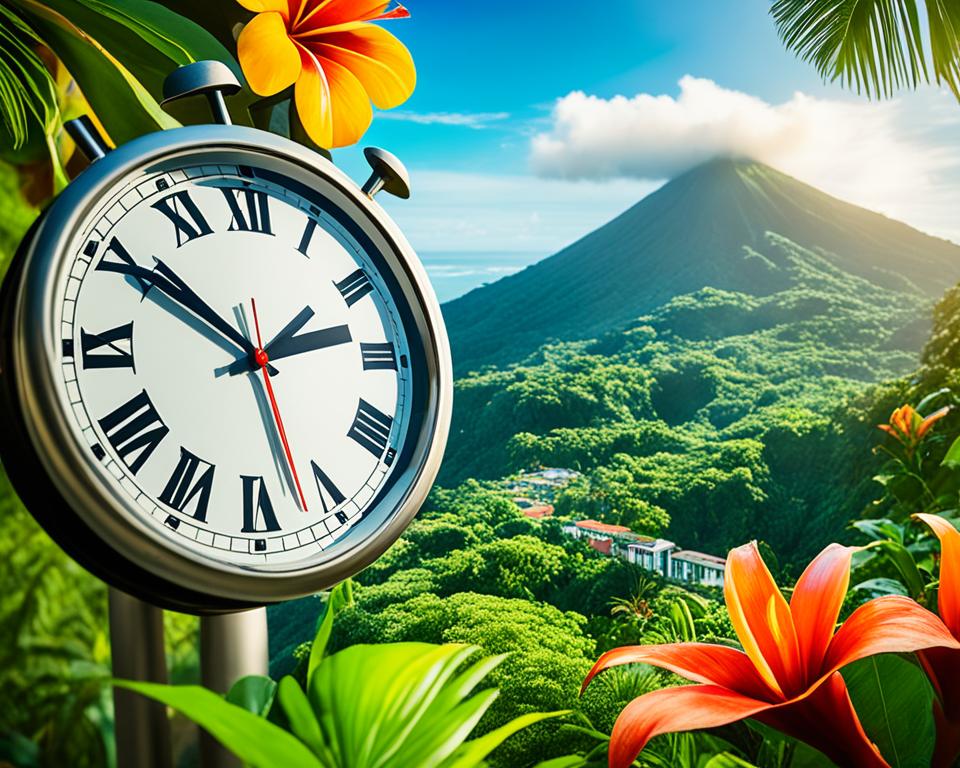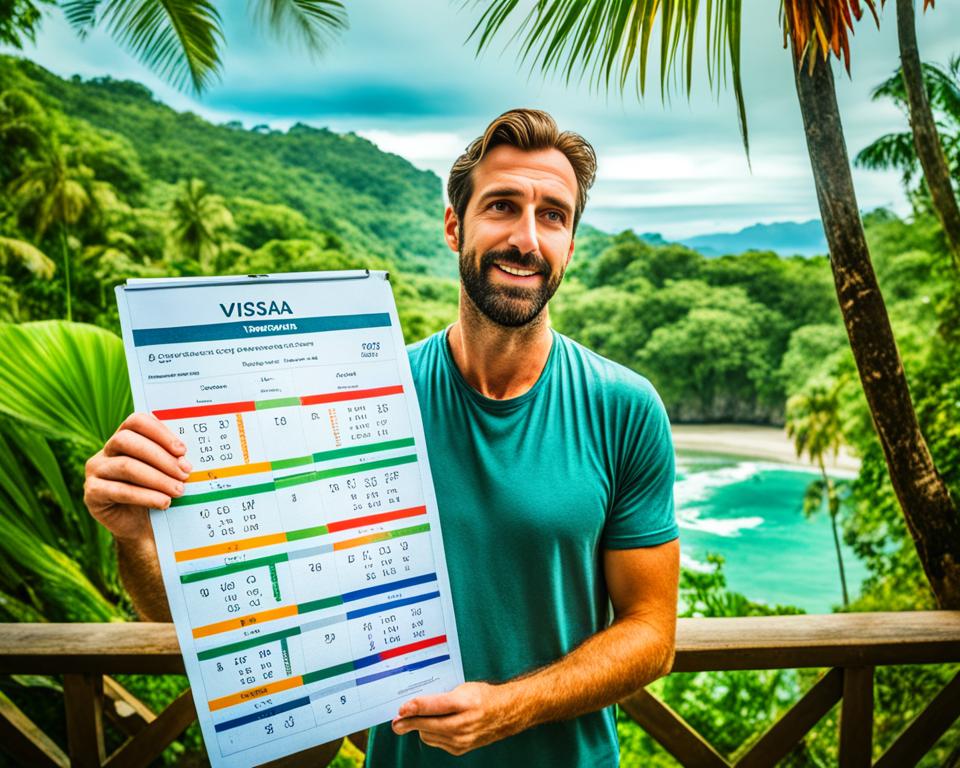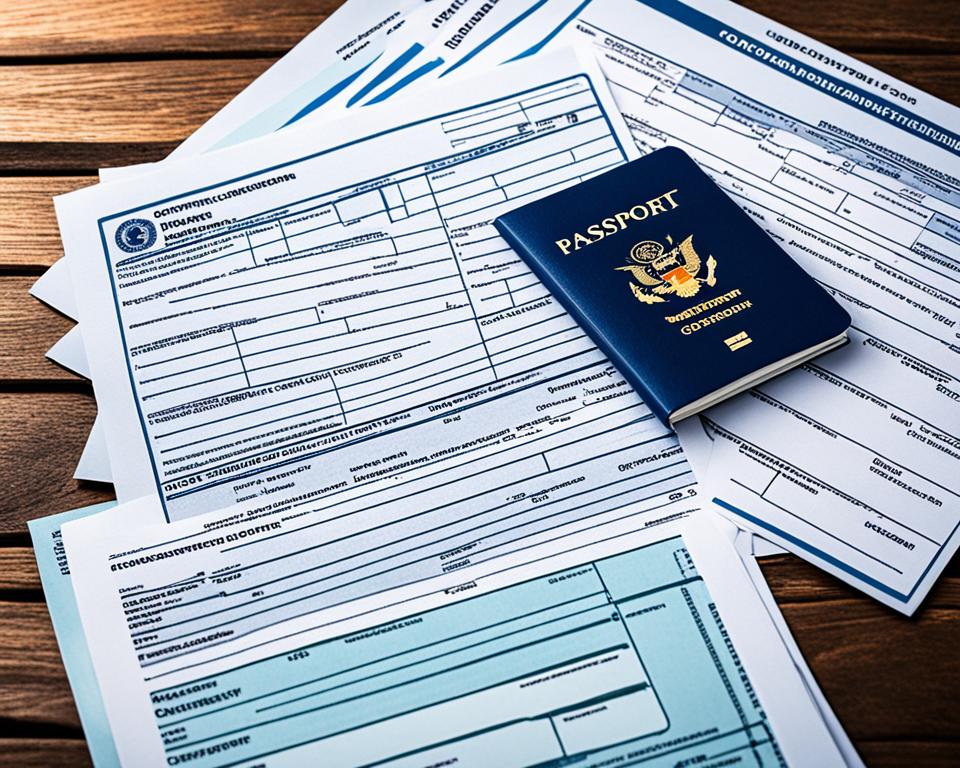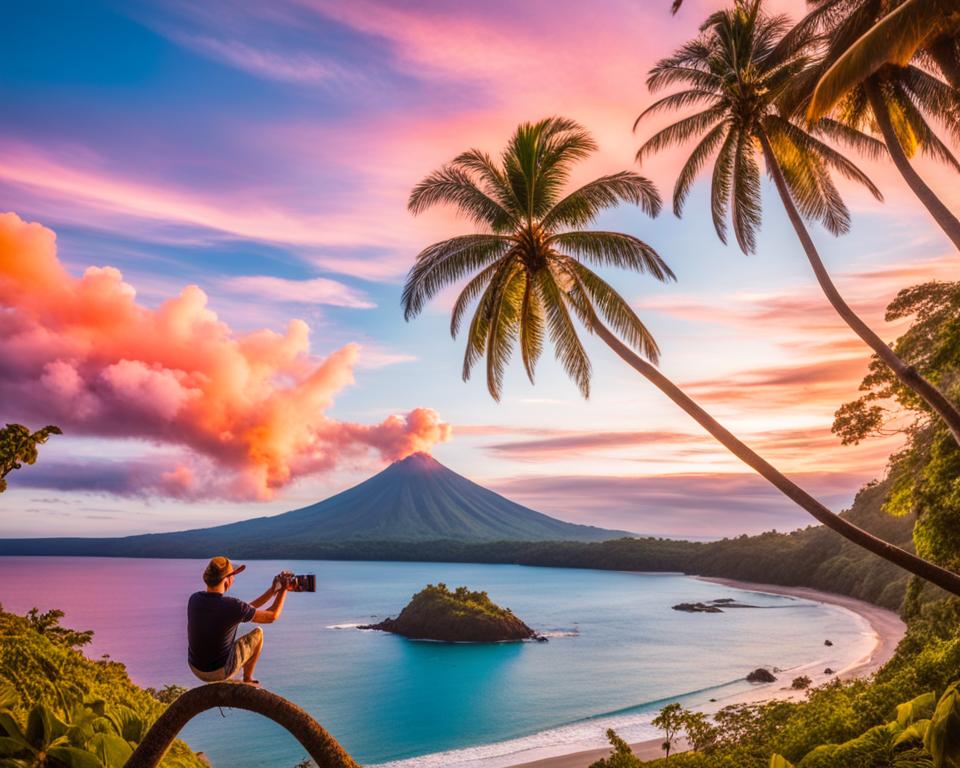As a hub for international workers and service providers, Costa Rica has introduced Law No…

How Long Can You Live in Costa Rica Without Residency
Ever thought about enjoying Costa Rica’s Pura Vida without the need for residency? This beautiful country is a dream spot for many travelers. But, figuring out Costa Rica’s immigration laws can be tricky. If you want to live in Costa Rica as a tourist, it’s important to know the rules.
This article will cover how long you can stay without residency and what options you have to stay longer. Getting advice from Costa Rica Immigration Experts is key to following the rules. This way, you can fully enjoy what Costa Rica has to offer.
Key Takeaways
- Costa Rica lets tourists from certain countries stay for up to 180 days.
- US and Canadian citizens can also enjoy 180-day visas.
- The digital nomad visa is great for longer stays without leaving often.
- It’s vital to understand Costa Rica’s immigration laws to avoid fines or being deported.
- Renewing your temporary residency is important before it expires.
- Staying longer than allowed can make getting residency in the future harder.
The Basics of Costa Rica’s Immigration Laws
It’s important to know about Costa Rica’s immigration laws if you plan to visit or live there. These laws set out rules for entering the country. They include how long you can stay as a tourist, which is usually up to 180 days without needing to live there.
You need to know what visa you need for Costa Rica, as it depends on where you’re from. This can change a lot based on your country of origin.
Understanding Tourist Visa Duration
The length of your stay in Costa Rica is key to planning your trip. Most visitors can come in without a visa for up to six months. But, going over this time can lead to fines or even trouble getting back in.
So, it’s important to stick to the allowed time to stay legally in Costa Rica.
Visa Requirements for Different Nationalities
Costa Rica has different visa rules for different countries. For example, people from the USA and Canada don’t need a visa but must have a valid passport and a ticket to go back home. Knowing these rules helps visitors follow the law and enjoy their visit without problems.

How Long Can You Live in Costa Rica Without Residency
Knowing how long you can stay in Costa Rica is key if you’re planning a trip. Visitors from places like the U.S., Canada, and many European countries can stay up to 180 days without a visa. After this, you must leave the country to start a new stay.
Permissible Length of Stay as a Visitor
You can’t stay in Costa Rica more than 180 days without a residency permit. Staying longer can lead to fines or trouble when you try to come back. Some people do short trips to the border to extend their stay, but this isn’t always easy.
Doing this too often might make it harder to get back in. Immigration might be watching those who keep coming and going.
Visa Extension Options for Tourists
If you want to stay longer than 180 days, you’ll need to look into visa extensions. One way is to leave and come back into the country. Or, you could apply for a temporary residency permit if you have a reason to stay, like retiring or investing.
It’s important to keep up with the laws on immigration. They can change. Talking to a lawyer can help you make the right choices and stay legal during your visit.

The Process of Applying for Residency
Getting residency in Costa Rica means knowing your options and meeting certain requirements. There are several ways to make Costa Rica your home, each suited for different situations. The main options include the pensionado (retired), rentista (rentier), and inversionista (investor) visas, each with its own rules.
Types of Residency in Costa Rica
There are three main types of residency, each with its own conditions:
- Pensionado: You need a monthly pension of at least $1,000, with no age limit.
- Rentista: You must show a monthly income of at least $2,500 for two years or invest $60,000 in a Costa Rican bank.
- Inversionista: You need to invest at least $150,000. Temporary residents can’t work until they get permanent residency after three years.
For digital nomads, there’s a special visa that lets you stay for up to a year with a $3,000 monthly income.
Documents Required for Residency Application
Applying for residency requires many documents, which are key for meeting Costa Rica’s rules. You’ll need:
- Birth certificates
- Police clearance reports
- Valid passport copies
- Proof of money, like pension statements or bank records
- Marriage certificates if you’re bringing a spouse
- Recent passport-sized photos
- Completed application forms
You must submit original documents to immigration. If your documents are in a language other than Spanish, consider getting help from a registered translator. For more info, check out Costa Rica Immigration Experts.

Knowing what you need is key to a successful residency application. Make sure you have all the right documents to make the process smoother in Costa Rica.
The Reality of Living in Costa Rica as a Tourist
Living in Costa Rica as a tourist is a mix of joy and challenges. The country’s culture, landscapes, and communities draw many travelers. But, it’s important to know the challenges of being a non-resident if you plan to stay longer.
Challenges of Being a Non-Resident
Non-residents face many hurdles. Getting to bank services and a Costa Rican driver’s license is hard. Rent is also high, with apartments costing $800 to $2000+ per month outside popular spots. The cost of living is rising, making everyday life tough.
There are legal issues too. Non-residents can’t work legally, limiting them to remote jobs. They must leave the country every 180 days to stay in tourist status, often going to Nicaragua or Panama. Costa Rica doesn’t have a Citizenship by Investment or Golden Visa program, making it hard to connect deeply with the country.
Perks of Living as a Tourist in Costa Rica
Despite the challenges, living in Costa Rica without residency has its perks. Tourists can dive into the culture and nature at their own pace. The country offers lush forests and beautiful beaches for exploration.
The immigration rules let tourists stay for 180 days, giving them a good taste of life here. Many visitors adjust well, using tourist rights to enjoy the country. They get to try local foods, traditions, and communities, making their stay special.

In summary, living in Costa Rica as a tourist has its ups and downs. You’ll face limits on services and legal issues. But, you’ll also get to experience rich culture and stunning nature. This mix shows the complex side of life as a tourist in this beautiful country.
Tips for Navigating Costa Rica’s Immigration Laws
Planning and knowing the rules are key to moving to Costa Rica smoothly. Keeping up with immigration news is crucial. It helps you make the right choices for your needs.
Staying Informed with Immigration Updates
The process of getting a visa can be tricky, with different rules for each type. Checking official sources for the latest visa rules is important. Sites like Costa Rica Immigration Experts offer great advice. They give details on what you need and how long things take.
Planning Visa Renewals and Border Runs
Renewing your visa is key if you want to stay longer. Knowing how to renew and when to leave the country helps keep your stay legal. For tourist visas, you must leave every 90 days.
Planning these trips right keeps you in line with the law. It also lets you enjoy Costa Rica more. Staying on top of visa renewals is a smart move.

Conclusion
Living in Costa Rica without residency is a dream for many. This article has shown the ups and downs of Costa Rica’s immigration laws. It’s important to know the rules to make the best choices for your situation.
For those thinking of staying longer, there are residency programs like Pensionado, Rentista, and Inversionista. Each one suits different needs and budgets. It’s key to meet the legal requirements to make the move smooth.
Using experts in Costa Rican law can make the immigration process easier. CRIE has helped many move from tourists to residents. They offer help with paperwork and access to good healthcare and schools.
So, whether you’re here for a visit or planning to stay, understanding Costa Rica’s immigration laws is crucial. It makes living here more enjoyable and worry-free.
FAQ
How long can I stay in Costa Rica as a tourist without residency?
You can stay in Costa Rica for up to 180 days without needing a residency permit.
What are the visa requirements for entering Costa Rica?
The visa rules change depending on where you’re from. Many from the USA and Canada don’t need a visa. They just need a valid passport and a ticket back home.
Can I extend my stay in Costa Rica beyond 180 days?
Yes, you can ask for a visa extension. But, you’ll need to leave the country and come back after a certain time.
What types of residency options are available in Costa Rica?
Costa Rica has different residency options. These include pensionado (for retirees), rentista (for those who earn income), and inversionista (for investors). Each has its own rules and paperwork.
What challenges do non-residents face while living in Costa Rica?
Non-residents might find it hard to access bank services, get a driver’s license, and must leave the country every 180 days.
What are the perks of living in Costa Rica as a tourist?
Living as a tourist lets you enjoy Costa Rica’s lively culture, beautiful views, and diverse wildlife without being a permanent resident.
How can I stay updated on immigration regulations in Costa Rica?
Keep up with immigration news through trusted sources like the official Costa Rica Immigration Experts (CRIE). This helps you follow the latest laws.
What should I know about planning visa renewals and border runs?
When planning to stay longer, be careful with visa renewals. You might also need to do border runs. This means leaving and coming back to Costa Rica to start your tourist time over.
Source Links
- https://internationalliving.com/countries/costa-rica/visa/
- https://crie.cr/how-long-can-i-be-out-of-costa-rica-before-losing-residency/
- http://www.costarica-embassy.org/index.php?q=node/147
- https://quatro.legal/expats/
- https://crie.cr/how-long-can-you-live-in-costa-rica-without-residency/
- https://www.acacialegalcr.com/temporary-residency-vs-permanent-residency-in-costa-rica-differences-and-legal-considerations
- https://www.yourpuravida.com/do-i-need-residency-to-live-in-costa-rica/
- https://nomadcapitalist.com/global-citizen/costa-rica-residence/
- https://cr.usembassy.gov/services/residency/
- https://visaguide.world/north-america-caribbean/costa-rica-visa/residence-permit/
- https://offshore-freedom.com/blog-articles/the-dark-side-of-living-in-costa-rica-for-expats/
- https://www.centralamerica.com/opinion/costa-rica-residency-vs-visa-runs/
- https://costa-rica-guide.com/living/relocate/residency-in-costa-rica-perpetual-tourism/
- https://gap.cr/navigating-costa-ricas-immigration-bureaucracy-with-crie-cr/
- https://www.specialplacesofcostarica.com/blog/moving-to-costa-rica-comprehensive-guide-to-relocating/
- https://osapropertymanagement.com/need-help-with-costa-rica-immigration-expert-advice/
- https://gap.cr/benefits-of-getting-residency-explained-2/
- https://senderos-cr.com/moving-to-costa-rica/
- https://www.gaprealestate.com/how-to-get-permanent-residency-in-costa-rica/


